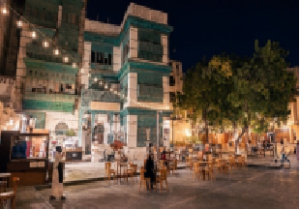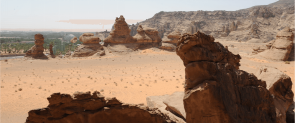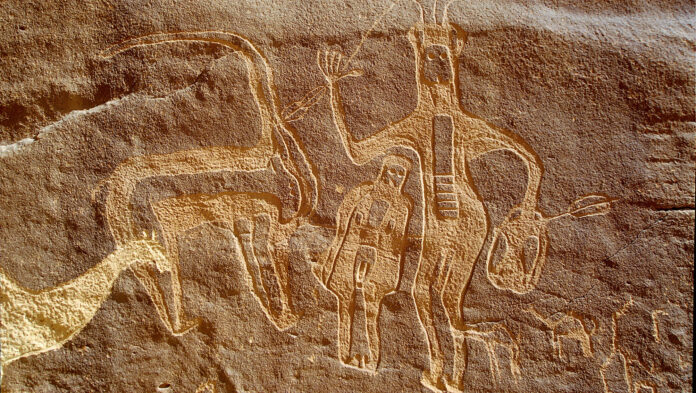Saudi welcomes 8th site on UNESCO World Heritage List: Al-Faw Archeological Area
Spokesman Report
Saudi lies at the heart of Arabia, a land of living wonders and legends. From ancient landscapes, natural and cultural treasures, Saudi is where the tales of the past are an integral part of today’s life.
Adding another gem to its ever-expanding collection of global wonders, Saudi has just unveiled its eighth UNESCO World Heritage Site. Recognized for its outstanding cultural and natural significance, the Al-Faw Archaeological Area, located south of Riyadh, at the northwest of the Empty Quarter, has now joined the list. This ancient site, with nearly 12,000 archaeological remains spanning from prehistoric times to the 5th century CE, offers a remarkable window into the life and achievements of early civilizations. UNESCO’s latest inclusion highlights the global significance of Saudi’s unique cultural treasures.
From cultural to natural World Heritage Sites, from the ancient rock art of the Hail Region to the lush landscapes of Al Ahsa Oasis, the towering tombs of Hegra at AlUla, to Historic Jeddah and At-Turaif, and more, these sites reflect the diversity of the Arabian Peninsula, a melting pot of peoples and languages, still present in today’s culture and traditions.
Here are Saudi’s 8 UNESCO World Heritage Site – ready to be explored, discovered and remembered:
The Cultural Landscape of Al-Faw Archaeological Area: discover Saudi’s newest World Heritage Site
Get ready to be transported through the centuries at the Al-Faw Archaeological Area, Saudi’s newest UNESCO World Heritage Site. Located about 700 kilometers (435 miles) south of Riyadh, this ancient hub of trade and civilization invites you to uncover nearly 12,000 remnants spanning from prehistoric times to the 5th century CE.
Regularly scheduled flights are available from Riyadh to Najran Regional Airport, which is approximately a 2.5 hour drive from Al-Faw. Saudia (offering flights from Jeddah and Riyadh), Flynas (from Dammam, Jeddah, and Riyadh), and Flyadeal (from Dammam and Riyadh) provide convenient options and efficient way to reach this historic site. Transportation to Al-Faw can be arranged through taxis or car rental services like Al Wefaq Rent a Car and Lumirental.
Imagine a time when the desert was a bustling thoroughfare, with traders from distant lands mingling at this oasis town, strategically positioned along key trade routes. In Al-Faw, 6,000 years of human habitation come alive through inscriptions, tools, artifacts, and a well-preserved water management system. Set against the breathtaking backdrop of the Rub’ al-Khali desert and the Tuwaiq Mountain range, you can almost hear the whispers of the ancients.
The journey through Al-Faw is not just a walk-through ruins; it’s an immersion into the vibrant life of an ancient trading hub. The landscapes enhance the experience, with breathtaking views that remain unchanged from days past. With each step, you connect with the deep historical roots of the region, discovering how Al-Faw played a pivotal role in shaping this part of the world.
Hegra Archeological Site: remember the past
Step into the ancient city of Hegra, Saudi’s first UNESCO World Heritage Site, and embark on a journey through time. As you wander among the monumental tombs carved into the rock, you’re stepping into a world where the Nabatean civilization once flourished. Imagine the grandeur of 111 intricately adorned tombs, each one a masterpiece of architectural brilliance that whispers tales of an ancient people’s ingenuity and artistry.
The facades tell stories through their elaborate carvings, while inscriptions and ancient water wells reveal the daily lives and spiritual practices of a civilization that thrived more than two millennia ago. Visiting Hegra feels like entering a living museum, where every stone and carving holds a piece of history. Allow yourself to be transported to an ancient era, where the air is thick with the mysteries of the past, and each corner of this majestic site offers a glimpse into a world both captivating and enigmatic.
At-Turaif District in Diriyah: visit the birthplace of the Saudi state
 Walking into the heart of the At-Turaif District in Diriyah, known as “The City of Earth,” is the founding place of the First Saudi State in 1727. At its heart sits the UNESCO World Heritage Site of At-Turaif, a cradle of Saudi culture where the echoes of Saudi’s past come alive. Imagine wandering through the ancient streets of this historic birthplace, where the origins of the Saudi state are vividly preserved, where the mud-brick buildings and traditional Najdi architecture stand as timeless witnesses to a bygone era. Each structure tells its own story, reflecting the ingenuity and resilience of early Saudi civilization, and offering a glimpse into the way people once lived and organized their society.
Walking into the heart of the At-Turaif District in Diriyah, known as “The City of Earth,” is the founding place of the First Saudi State in 1727. At its heart sits the UNESCO World Heritage Site of At-Turaif, a cradle of Saudi culture where the echoes of Saudi’s past come alive. Imagine wandering through the ancient streets of this historic birthplace, where the origins of the Saudi state are vividly preserved, where the mud-brick buildings and traditional Najdi architecture stand as timeless witnesses to a bygone era. Each structure tells its own story, reflecting the ingenuity and resilience of early Saudi civilization, and offering a glimpse into the way people once lived and organized their society.
As you explore the area, you’re transported to the roots of Saudi history. The preserved buildings and the Diriyah Museum provide a window into the past. At-Turaif is not just a place of history; it’s a vibrant living canvas where ancient and modern blend seamlessly. Experience the lively cultural events, traditional music, dance, and art performances that breathe new life into the historic setting. Local restaurants invite you to savor authentic Saudi cuisine, each bite a testament to the region’s deep culinary roots. Dive into an unforgettable journey into the soul of Saudi. Every alley and structure weave a story, creating a colorful mosaic of legend and legacy that captivates and inspires, drawing you into a timeless narrative of the past and present.
Historic Jeddah (Al-Balad): uncover the cosmopolitan heart of the Red Sea
 Step into the historic heart of Jeddah, and travel back in time to when this vibrant district was a bustling port of global significance. As a UNESCO World Heritage Site, Historic Jeddah showcases its cosmopolitan legacy through unique coral stone buildings and traditional architecture. Wander through lively souks and ancient mosques, where every corner reveals stories of traders, pilgrims, and diverse cultures that once flowed through the city.
Step into the historic heart of Jeddah, and travel back in time to when this vibrant district was a bustling port of global significance. As a UNESCO World Heritage Site, Historic Jeddah showcases its cosmopolitan legacy through unique coral stone buildings and traditional architecture. Wander through lively souks and ancient mosques, where every corner reveals stories of traders, pilgrims, and diverse cultures that once flowed through the city.
Historic Jeddah is more than just a historic district, it is a journey back in time with its 7th-century architecture and narrow streets filled with stalls offering spices, jewelry, textiles, and perfumes. It is also a living center for art and culture. Explore Zawiya 97, where local artists and craftsmen display their work, and immerse yourself in the creative energy of master classes and workshops. This dynamic space fosters a deeper understanding of traditional crafts and contemporary art, reflecting the authenticity of the area. Historic Jeddah’s blend of old-world charm and its pivotal role in the Red Sea’s trade routes, combined with its flourishing art scene and lively festivals, underscore its profound historical value. Experience a captivating glimpse into Saudi’s past, seamlessly intertwined with its present.
Rock Art in the Hail Region
 Discover the Rock Art in the Hail Region, where ancient petroglyphs and inscriptions reveal the artistic spirit of prehistoric times. At Jubbah and Shuwaymis, these intricate carvings of human and animal figures transport you to an era when early societies expressed their lives and environments through rock art. As you explore this timeless gallery, the ancient carvings whisper stories of past civilizations, weaving an unbreakable connection with the land.
Discover the Rock Art in the Hail Region, where ancient petroglyphs and inscriptions reveal the artistic spirit of prehistoric times. At Jubbah and Shuwaymis, these intricate carvings of human and animal figures transport you to an era when early societies expressed their lives and environments through rock art. As you explore this timeless gallery, the ancient carvings whisper stories of past civilizations, weaving an unbreakable connection with the land.
The Rock Art in the Hail Region invites you to witness the creative brilliance of early humans and embark on a profound journey into the depths of our shared cultural heritage. Each carving whispers ancient tales, with the petroglyphs in Jubbah and Shuwaymis dating back to the Neolithic period and the early Bronze Age, reflecting the lives of early inhabitants and their bond with the land, creating an inspiring and unforgettable exploration of Saudi’s past legends. To reach these remarkable sites, fly into Hail Regional Airport, then take a short drive to Jubbah and Shuwaymis. Guided tours and local maps are available to help you navigate the area.
Al Ahsa Oasis: journey through an evolving cultural landscape
Journey through the Al Ahsa Oasis, a UNESCO World Heritage Site celebrated for its lush beauty and ancient agricultural brilliance. To visit, fly into Al Ahsa International Airport, which is well-connected to major Saudi cities. From there, you can easily reach the oasis by car or taxi, traversing the scenic desert landscape.
As one of the largest oases in the world, Al Ahsa stands as a living testament to human innovation, featuring vast palm groves, historic irrigation canals, and ancient forts. Historically, it has been a crucial supplier of dates and fresh produce to the region, supporting local communities and trade routes. Its fertile lands have sustained the surrounding inhabitants for centuries and continue to provide agricultural products to local markets and beyond.
Walking amidst these verdant landscapes, you’ll find yourself enveloped in tranquility, where the echoes of history resonate through the serene surroundings. The oasis invites you to experience a unique blend of natural splendor and history, with every corner revealing a story of human perseverance and cultural legacy.
‘Uruq Bani Ma’arid: discover the iconic wilderness of Arabia
Unveiled at the end of last year, ‘Uruq Bani Ma’arid is Saudi’s 7th UNESCO World Heritage Site, situated on the western edge of Ar-Rub’ al-Khali, or the Empty Quarter. This vast and remote expanse epitomizes Saudi’s iconic wilderness, featuring one of Earth’s most breathtaking landscapes, and incredible ecosystem and wildlife. It is home to the Arabian Oryx—now the focus of a successful reintroduction program—as well as the Arabian Sand Gazelle and the Arabian Mountain Gazelle, underscoring Saudi’s commitment to preserving its natural heritage and endemic species. For the best experience, visit during the winter months when the weather is milder. To reach ‘Uruq Bani Ma’arid, fly into Riyadh or Dhahran and proceed with a 4×4 vehicle – using a local guide is strongly recommended to navigate the challenging terrain.
Hima Cultural Area: Petroglyphs and Inscriptions
Nestled in the southwestern part of Saudi, the Bir Hima rock petroglyphs present a distinctive canvas of prehistoric artistry that transcends time. Unlike other petroglyph sites, Bir Hima stands out for its extensive collection of intricate carvings that vividly depict the dynamic interactions between early human societies and their environment.
Picture yourself amidst these ancient engravings, which date back thousands of years, where the rock surfaces burst with vivid scenes of wildlife, human rituals, and ceremonial practices. Each petroglyph serves as a silent storyteller, offering unique insights into the cultural and spiritual life of bygone civilizations. Unlike other sites, Bir Hima’s petroglyphs reveal a complex interplay of daily life and ceremonial practices, showcasing the core of human expression. This exceptional gallery invites you to explore its timeless artistry, where every carved figure and symbolic scene offers a window into the profound narratives of early human creativity and connection to the natural world.
The land is calling to those who dream, with Saudi’s eight UNESCO World Heritage Sites offering an inspiring journey through history and culture. Rooted in Saudi traditions, hospitality, and community, these sites invite you to uncover the stories and secrets that have shaped the heart of Arabia.



